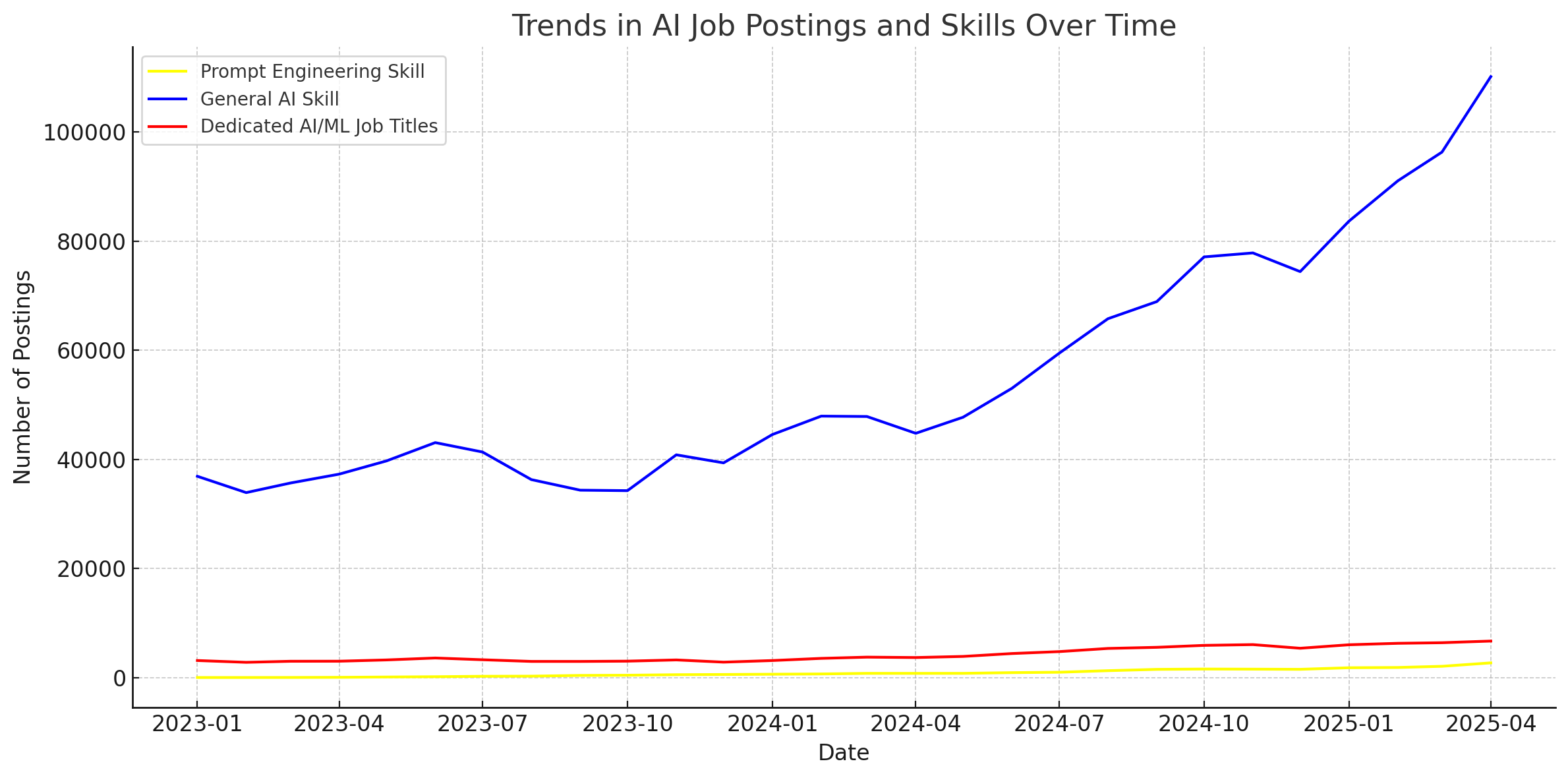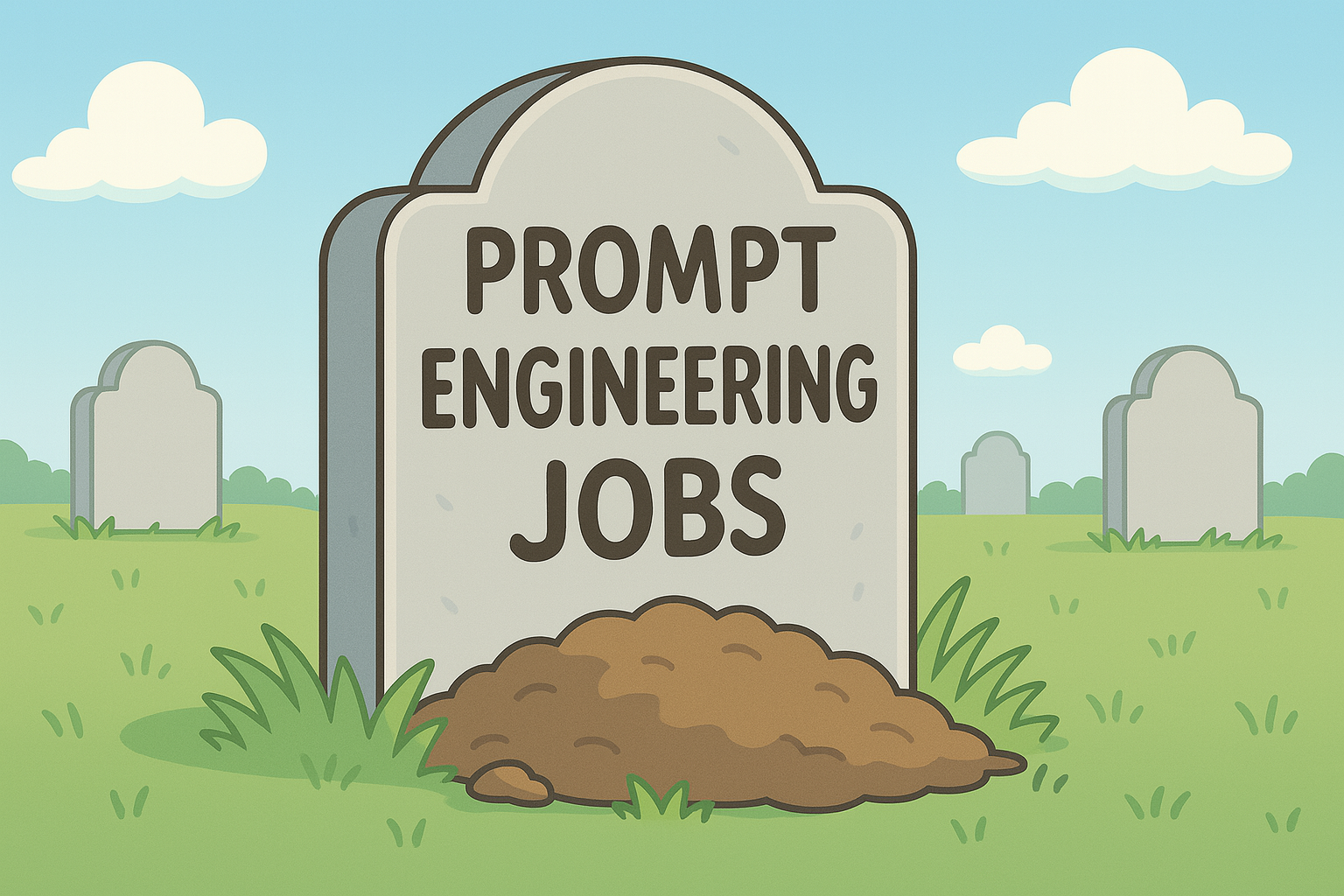When was the last time you heard about a prompt engineer?
In the heady early days of artificial intelligence, prompt engineers — a job that doesn't necessarily require technical skill — were supposedly earning $350,000 a year as a liaison to this strange new world. Now, not so much.
Were Prompt Engineers Just Hype?
“Prompt engineering as a standalone role is becoming obsolete,” said Aaron Sines, director at Austin-based tech recruiting company Razoroo. While some companies are still looking for them, openings for the role have dropped 80% to 90% from what it was when large language models (LLMs) were coming out in 2022, he said.
In fact, many now say the whole prompt engineer fad was overblown. “We’ve been watching for the past 2-½ years or so,” said Seth Robinson, vice president for industry research at the Computing Technology Industry Association (CompTIA). “The data never really showed a wide range of jobs for prompt engineers at all, much less for a lot of high salaries.”

Rick Battle, staff machine learning engineer at VMWare, added, “The ‘prompt engineer’ job title was a flash in the pan. Getting useful results out of LLMs is a skillset in the same way that being good at searching Google back in the day was a skillset. But no one was ever hired as a ‘Google Search Specialist.’”
Similarly, Aline Lerner, CEO at interviewing.io, a company that helps software engineers practice interviewing for jobs at companies, never saw much demand from clients for prompt engineering roles. “We never did mock interviews for prompt engineers. The minute they need something, they start emailing us. We never once heard for help in becoming a prompt engineer. If it were really this very lucrative position, some of the junior users would have been coming to us asking for help.”
“It’s definitely been an interesting narrative to follow — the rapid rise in interest in this role when we weren’t seeing it in our data,” Robinson said. And now that people are saying prompt engineering is no longer a thing, “It made us say, ‘well, was it ever?’”
Prompt Engineering, Not Prompt Engineers
“Today, prompt engineering is no longer a standalone role — it’s a baseline expectation.”
- Joe Davis
EVP of Platform Engineering & AI Technology, Service Now
Ironically, AI did what it isn’t supposed to do: It got good enough to put people out of work — in this case, prompt engineers.
“In the early days of LLM adoption, we hired specialists with deep expertise in prompt engineering — people who knew how to craft the precise inputs needed to get meaningful results. At the time, that skillset was critical to unlocking the potential of these models,” said Joe Davis, executive vice president of platform engineering & AI technology for ServiceNow.
But the whole point of generative AI, in particular, is that it understood human language, said Dan Gardner, co-founder and executive chair of Code and Theory. “The foundation models’ goal is to create more semantic, human-like engagements so it feels more like the way I engage,” he said. “It’s less learning about the system than the system learning about me. That’s why everybody can use it. It’s not like we went to school for ChatGPT. My children use it.”
Battle, who studied AI prompting and said a year ago that AI models were better than humans at creating prompts, said that things have changed since then. While he hasn’t formally retried his experiments, he did note that Llama 3 scored much higher out of the box than Llama 2 did, so there was far less headroom for improvement via prompt engineering. In addition, AI model-generated prompts were much less creative.
“I don't see that as a bad thing, though,” added Battle. “It means the models are maturing, and thus, less chaotic prompting strategies are required for good results.”
Prompt engineering has become something anyone could do. “Today, prompt engineering is no longer a standalone role — it’s a baseline expectation,” Davis said. “Every engineer working on our AI platform is expected to understand how to design and optimize prompts as part of building intelligent systems. It’s a foundational capability woven into the way we develop AI.”
“There is less of a need for dedicated prompt engineers as a separate job title,” agreed Stefan Leichenauer, vice president of engineering for SandboxAQ, which he said doesn’t employ prompt engineers. “I compare it to typing, which was once embodied in a specialized role but is now a fundamental skill for many jobs.”
Related Article: Has AI Already Replaced the Need for Prompt Engineers?
What’s the Next ‘Prompt Engineer’ AI Job?
What was attractive about the prompt engineer was that it was an on-ramp for non-engineers into the high-paying world of AI, Lerner said. Tech recruiting is similar, but whenever there’s a downturn in the economy, tech recruiters are the first to go. “They’re the canary in the coal mine,” she explained. Because the demand for recruiters was shrinking post-COVID, prompt engineers seemed like an attractive option.
But even the prompt engineer’s reputation of being a job non-technical people could perform was overblown, said Joshua Gross, associate professor of computer science at California State University Monterey Bay. “I never heard of a situation where someone who was not skilled was hired into a role because they could use ChatGPT,” he said.
Something similar is happening now with so-called “vibe coding.” “The idea behind it is you don’t write code, you tell ChatGPT or Copilot what you want and it produces it,” Gross explained. “The underlying idea is you never have to actually write a line of code, just describe the system that you want. But the assumption, even with vibe coding, is that the person is a programmer at some level, because you need to turn it into a working system.”
“Everyone I talk to, engineers, they’re all vibe coding,” Sines confirmed. “Everyone is experimenting with tools, and their children are building apps and tools. It’s creating the next billion software engineers.”
But Gross isn’t so sure. While it can be useful for students with API libraries with which they’re unfamiliar, “I have encountered nothing but problems with vibe coding, even with students who are fairly competent at programming,” he said. “I find that when they get to the point to do something specific, it can be nearly impossible to get ChatGPT to get code that does what you want to do. I don’t think we’ll see that a non-technical person can build a production-quality system.”
Lerner sees demand for machine learning engineers. “A lot of software engineers are reskilling to become machine learning engineers because it’s growing faster and is more lucrative,” she said. “But it’s not the kind of job that a non-technical person can walk into. You’re a software engineer and then some specialized skills on top of that.”
But while the idea of a position where a non-technical person could get a lucrative AI job may have been just another AI hallucination, roles for AI liaisons are still there.
“As the need for humans writing code goes away, the need for people who know how to orchestrate and architect prompting to control computing will skyrocket,” predicted Jules White, professor of computer Science and senior advisor to the Chancellor for generative AI in education and enterprise solutions at Vanderbilt University in Nashville, Tenn. “Whether this job role will be called ‘Prompt Engineer’ or ‘AI Agent Engineer’ or ‘AI Engineer’ or ‘Agentic Engineer’ is unclear. However, the core skill will be in huge demand. It isn't about wordsmithing, though — it is about decomposing and solving problems through sequences of prompts, concepts, architectures and computing integrations.”
